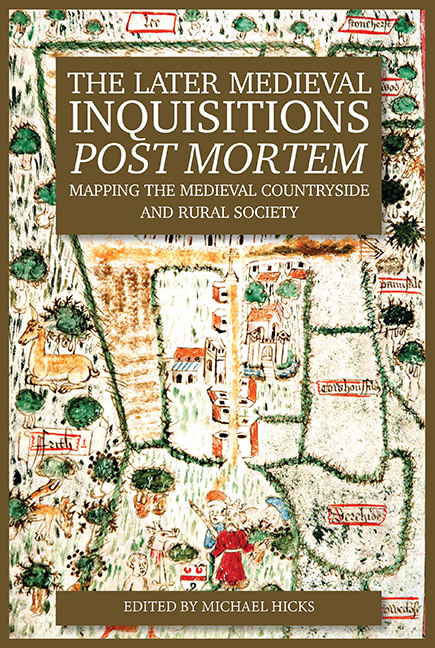Book contents
- Frontmatter
- Contents
- List of Illustrations
- List of Contributors
- Glossary
- List of Abbreviations
- 1 Introduction
- 2 Records of an Imperial Administration? Inquisitions Post Mortem in Scotland and Calais
- 3 Inquisitions Post Mortem in Medieval Ireland
- 4 The Court of the Honour of Clare, 1308–60: Feudal Incidents and Inquisitions
- 5 Landscape, Farming and Society in an English Region: The Inquisitions Post Mortem for the West Midlands, 1250–1509
- 6 Beyond the Dots: Mapping Meaning in the Later Medieval Landscape
- 7 Fairs and Markets in the Inquisitions Post Mortem
- 8 The Structure of the Milling Industry 1427–37
- 9 Proofs of Age 1246 to 1430: Their Nature, Veracity and Use as Sources
- 10 What Went On in the Medieval Parish Church, 1377–1447, with Particular Reference to Churching
- 11 Retainers, Monks and Wine: Three Insights into Everyday Life
- 12 The Administration and Efficiency of the Inquisitions Post Mortem Process: A Case Study of Northumberland
- 13 Late Medieval Land Disputes and the Manipulation of the Inquisitions Post Mortem
- Index
6 - Beyond the Dots: Mapping Meaning in the Later Medieval Landscape
Published online by Cambridge University Press: 26 May 2021
- Frontmatter
- Contents
- List of Illustrations
- List of Contributors
- Glossary
- List of Abbreviations
- 1 Introduction
- 2 Records of an Imperial Administration? Inquisitions Post Mortem in Scotland and Calais
- 3 Inquisitions Post Mortem in Medieval Ireland
- 4 The Court of the Honour of Clare, 1308–60: Feudal Incidents and Inquisitions
- 5 Landscape, Farming and Society in an English Region: The Inquisitions Post Mortem for the West Midlands, 1250–1509
- 6 Beyond the Dots: Mapping Meaning in the Later Medieval Landscape
- 7 Fairs and Markets in the Inquisitions Post Mortem
- 8 The Structure of the Milling Industry 1427–37
- 9 Proofs of Age 1246 to 1430: Their Nature, Veracity and Use as Sources
- 10 What Went On in the Medieval Parish Church, 1377–1447, with Particular Reference to Churching
- 11 Retainers, Monks and Wine: Three Insights into Everyday Life
- 12 The Administration and Efficiency of the Inquisitions Post Mortem Process: A Case Study of Northumberland
- 13 Late Medieval Land Disputes and the Manipulation of the Inquisitions Post Mortem
- Index
Summary
Historians are increasingly interested how past people used and understood their material surroundings, including the way in which ordinary inhabitants shaped their sense of identity in relation to the places where they lived. The aim of this paper is to highlight the value of inquisitions post mortem (IPMs) for the study of peasant perceptions of landscape in the period between 1200 and 1500. IPMs not only help us to reconstruct the character of the environment at a local level, they also include many peasant bynames as well as field-names and other minor placenames, which shed light on contemporary practices and attitudes in relation to specific territories. Because they were coined by ordinary inhabitants, bynames and field-names offer a rare glimpse of the experiences and outlook of peasants rather than of lords or clergy. The analytical value of these names is all the greater when they are mapped at a large scale – in other words that of the village, parish and hundred – rather than in the kind of small-scale distribution maps familiar from the work of economic historians who have used IPMs to study medieval farming. Insights will be taken from the South Oxfordshire Project, an intensive study of the fourteen parishes of Ewelme hundred in south Oxfordshire, as well as from a broader survey of the IPMs, mainly from the most recent and detailed calendars.
The Research Context
Concern with people's sensory and cognitive engagement with their environment in the past has grown in recent decades, thanks to related developments in several disciplines. In the medieval field, the concepts of ‘space’ and ‘place’ have become fashionable amongst literary scholars, art historians, place-name specialists and archaeologists as well as social historians. One area in which such concepts have been fruitfully applied is the study of buildings. There have been important investigations into the way that houses, churches and religious precincts were used to shape or reinforce behaviour and attitudes, notably amongst those tracing the development of gender norms. Beyond the confines of buildings, attention has been paid to the creation and use of public spaces in cities and towns.
Research on medieval rural settlements has felt some of the influence of this ‘spatial turn’, but the impact has so far been limited. Most of the landscape history work of medievalists continues to focus on landscape as structure rather than landscape as meaning.
- Type
- Chapter
- Information
- The Later Medieval Inquisitions Post MortemMapping the Medieval Countryside and Rural Society, pp. 84 - 99Publisher: Boydell & BrewerPrint publication year: 2016



